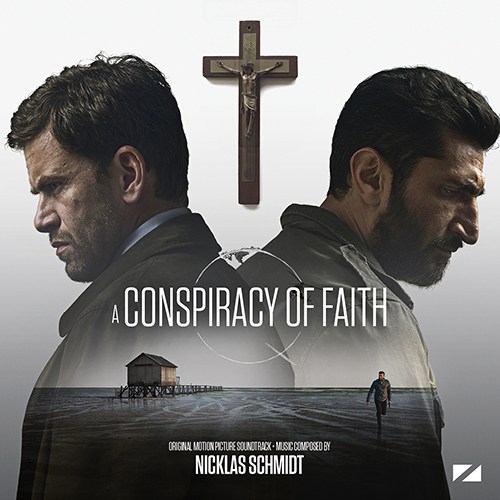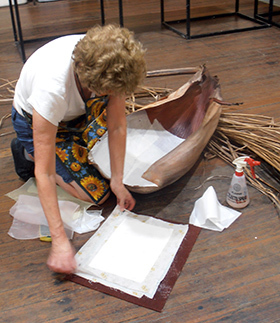
This was the third and, to date, most recent Department Q film, first broadcast last year. Given their popularity in Denmark, and the existence of at least four more adaptable novels, there’s every reason to anticipate that this won’t be the last, and on the evidence of ‘A Conspiracy of Faith’, I’d welcome it.
I haven’t been greatly impressed by the first two films – too reliant on cliche, too slow and in the case of Nikolas Lie Kaas’s portrayal of Carl Morck, too one-notedly grumpy – but this one was head and shoulders above its predecessors, with a genuine sense of atmosphere, some superb cinematography, especially in the countryside of flat flowery fields and boundless skies, and in Pal Sverre Hagen’s Johannes, a villain of charismatic intensity.
What’s more, where the first two films were both underplotted, stretching an hour or so’s plots into longer time-frames, it was hard to believe that so much happened in so short a time. There was probably about three hours worth of story presented in 105 minutes, with the least sense of anything being short-changed.
The story began with a message in a bottle, floating ashore after eight years, and opening up the unreported disappearance of a boy named Poul, son of Jehovah’s Witnesses, who we later learned, from his surviving brother, Trygve, murdered by an adult, stabbed to death with scissors, with the surviving younger brother threatened into silence.
The bottle comes to Department Q, currently consisting of Assad and the slightly hyperactive Rose (Johanne Louise Schmidt again excellent). Carl is absent, on sick leave, a burn-out case. It’s an unusual angle to explore, and his absence, even when present, took the story in a direction I’d not often seen before.
Carl’s got it bad. Assad’s concerned, and so, later in the story, is the representative of the Viborg Police, the authorities where another pair of children have gone missing, kidnapped by Johannes. Lisa, played by Signe Anastassia Mannov, plays only a minor role in the story, but has the feel of a series regular being introduced in a minor role, like Rose last time. As Ms Mannov is exactly the kind of blonde-haired Scandinavian woman I tend to notice in such programmes, that will be no hardship.
Johannes is not merely a kidnapper but a serial killer. He’s clever and collected, posing for years as a family friend to get to know the children, taking the families for everything, but only ever returning one child. He preys upon deeply religious families, often from outre faiths. Magdalene and Samuel’s parents belong to The Lord’s Disciples (who believe Jesus was born in Texas: thankfully, they appear to be fictional). He steals the children on religious festivals.
He also has a slightly older lover in Copenhagen, Mia (played by Lotte Anderson, who we all know) but when it comes to love-making he seems to prefer to make her get herself off, a process that causes him to laugh in a very mood-busting manner.
Johannes is very much in the mold of the extremely clever serial killer, such as Hannibal Lecter. He concocts a complex plan for the delivery of the ransom money by the children’s taciturn but decent father, Elias, that circumvents a massive Police operation to capture him. Elias jumps from the train to confront him, but ends up being stabbed with the scissors – an horrifically graphic sequence, carried out in painful slowness.
Elias winds up in hospital, on life support. His wife, Rakel, blames Carl, who at this point is blaming himself and pushing away Lisa’s attempts to support him. Out of seeming nowhere, Carl senses Johannes is in the hospital (I didn’t get what seemingly triggered Carl’s suspicions, something like an alarm that didn’t go off?). he’s there to finish Elias off, and inject Rakel with something that gives her seizures. She’s found in time to be saved but Elias dies clutching the hand of Assad, who he’d previously been grossly prejudiced against.
The Police surround the hospital but Johannes escapes, by being allowed to drive a car out of the garage. Unfortunately, he’s already killed the young detective, Pasgard, that Rose has shown an interest in, and he’s knocked out and kidnapped Carl, who he takes to the boathouse where the two children are being kept.
As the Police hunt desperately for Carl and the kids, it all starts to come out. We’ve seen flashbacks of the young Johannes, with an abusive mother, screaming at him to read The Lord’s Prayer in Danish, not Norwegian, screaming at Johannes’ older sister that neither of them were wanted. Now we see her throw hydrochloric acid into the face of the girl, Rebecca, blinding and burning her. And we see young Johannes approach his mother, asleep in bed, and stab her to death. With long-nosed, sharp scissors.
In between comes the most horrible part of the film. Johannes explains to Carl what he is doing and why. He is the Devil’s Son, you see. Not his only, chosen son, but one of many, soldiers spreading the Devil’s ‘faith’ as it were. It’s utterly insane, but it arises naturally from the background we are now seeing in full, and Hagen gives it a kind of comprehensible sanity.
Johammes sees himself as a faith-buster. He takes and kills the children of the deeply faithful, he destroys them. They live on, their faith stolen. God did not help, did not serve or rescue. Like stones in a pond, they spread their faithlessness thereafter. He plans to do the same to Carl. Carl might not believe, might regard all religion as stupid superstition, fit only for morons, but Carl has faith. With a terrifying calm, Johannes throws Samuel into the water and holds him under. He lets him up, toying with him, several times, as Carl pleads that he be taken instead, but finally holds the boy under until he ceases to struggle and the bubbles stop.
Carl has had to watch it. He puts his faith in himself, in the Law, in what they do, and he will henceforward have to live with the knowledge that this little eight year old boy was killed in front of his eyes and his being there made no difference whatsoever.
Next, Johannes frees Magdalene and gives her the scissors, asking her to stab him.Whether this was a genuine offer or a trick, we won’t know: she refuses to do it, will not take that step, which disappoints him.
What might have followed is interrupted by the sound of a helicopter. carrying Assad. Johannes runs: Carl gets Magdalene to free him and he immediately dives in. There are bones beneath, but he gets Samuel’s body out of the water, applies life-saving techniques, and with a rush of relief the boy spits water out, and opens his eyes.
Which leaves Assad to hunt down Johannes, in considerable openness, on the edge of water. Johannes strikes from concealment in the reeds, stabs Assad with the scissors, but his leather jacket saves him the worst. The two struggle. Assad gains the upper hand and, calmly, deliberately, holds Johannes’ head under water until he dies.
There followed an odd but very effective coda. Poul’s body had been retrieved and could now receive Christian burial. The service, which failed to impress me, being all about Poul being with God now, appeared to be being held for the benefit of Trygve alone, but at the back Department Q sat in a row: from right to left, Carl, Rose, Assad – and Lisa. A hymn started, not one whose words I recognised, about God and angels. Unexpectedly, Rose joined in in a thin, clear, unashamed voice. Carl looked at her, then dug out what was either a hymn book or a prayer book. His face slowly crumpled, and he began to cry. It was extraordinarily moving.
So this brief series ends, and whereas I wouldn’t bother watching either of the first two again, not even the one with Sonia Ritter, this I would sit down to again, for Hagen’s Johannes, for that affecting ending, and for those big skies, laden with cloud and sun and air, for that brilliant story.
Advertisements Share this:




